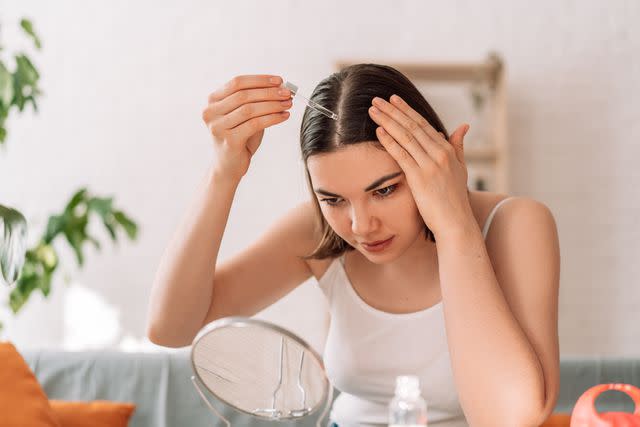Peppermint Oil for Hair Growth
How well does this essential oil work?
Medically reviewed by Arno Kroner, DAOM
Peppermint (Mentha piperita) is a natural cross between two types of mint: water mint (Mentha aquatica) and spearmint (Mentha spicata). It grows throughout North America and Europe. Peppermint oil is an essential oil taken from the leaves and flowering parts of the peppermint plant.
While some animal studies on the effects of peppermint oil on hair growth have been conducted, there is a lack of research to conclude that peppermint oil promotes hair growth in humans.
This article will discuss the possible hair growth benefits of peppermint oil, who should not use it, how to use it on the hair, and alternatives to try.

Nestea06 / Getty Images
Peppermint Oil, Hair Growth, and Possible Benefits
There is not enough quality evidence to conclude that peppermint oil benefits hair growth in humans.
A 2024 review that examined the potential for complementary and alternative supplements as a treatment for androgenetic alopecia (male- and female-pattern hair loss) found insufficient scientific evidence for using peppermint oil for this purpose.
Trials examining the effects of peppermint oil on mice have found results such as:
Increased dermal thickness, follicle number, and follicle depth after four weeks of topical applications
A mixture of peppermint, a type of chrysanthemum (Chrysanthemum zawadskii), peppermint, and licorice (Glycyrrhiza glabra) promoted hair growth and increased the number of hair roots
These and similar mice trials may be a starting point for research, but more research is needed to determine the effects of peppermint oil on human hair growth.
Should Anyone Not Use Peppermint Oil on Their Hair?
Peppermint oil contains menthol. Menthol can seriously negatively affect the breathing of an infant or small child and should never be applied to their face or allowed to be inhaled by them. If you have peppermint oil in your house, make sure it is stored away from where children can access it.
Applying peppermint oil to the skin may cause side effects such as:
Skin rashes
Irritation
Pruritus (itching)
How to Use Peppermint Essential Oil on Hair
Essential oils are not water soluble, but can be mixed with fats, alcohols, and ethers. They are often liquids with a lower density than water.
There is a scarce amount of knowledge about the potential applications of essential oils such as peppermint oil and their components in hair care.
Cosmetic formulations containing essential oils are a way to apply essential oils topically to the scalp.
What About Shampoo Infused With Peppermint Oil?
One study found that shampoo infused with a mixture of essential oils, including peppermint oil, and some conventional chemicals for preparing an antidandruff shampoo enhanced the product's efficacy.
This was believed to be because of the essential oils' antifungal properties and the anti-inflammatory properties of some of their components, including the menthol in peppermint oil.
Peppermint Oil Alternatives to Try Instead
Which treatment to use for hair loss depends on the cause of your hair loss. Before trying any treatment, talk to your healthcare provider to ensure it is right for you and your cause of hair loss.
The only products sanctioned by the U.S. Food and Drug Association (FDA) for hair loss treatment are:
Topical minoxidil (Rogaine and generic forms)
Oral finasteride (Proscar, Propecia)
Other established treatment for varying hair loss causes include:
Addressing any known triggers of hair loss, such as medications causing hair loss
If present, treating an underlying infection (such as using antifungal medications for a fungal scalp infection)
Cortisone creams, lotions, or injections
Phototherapy (light therapy)
Medications that suppress the immune system (in extreme cases of the condition alopecia areata)
Antiandrogenic medications
Iron supplements, if iron deficiency is present
Hair transplantation, a surgical procedure
Peppermint vs. Rosemary Oil for Hair
A 2024 literature review did not find sufficient scientific evidence for the use of peppermint oil in the treatment of androgenetic alopecia. Still, it did find the topical application of rosemary oil to be promising.
It proposed that rosemary oil may be used to combat hair loss like androgenetic alopecia or used with established treatments such as minoxidil and finasteride. However, more research is needed.
Summary
Peppermint oil is an essential oil from the leaves and flowering parts of the peppermint plant.
Some trials on mice have found promising results related to peppermint oil and hair growth promotion, but more research is needed to determine if these effects apply to humans.
Cosmetic products, such as shampoo, that contain peppermint oil may provide a means of applying peppermint oil topically to the scalp.
Treatment for hair loss depends on the cause, but may include medications such as minoxidil, finasteride, cortisone, and antiandrogens. Other treatments may include treating underlying infections, addressing possible triggers, and hair transplantation.
Read the original article on Verywell Health.

